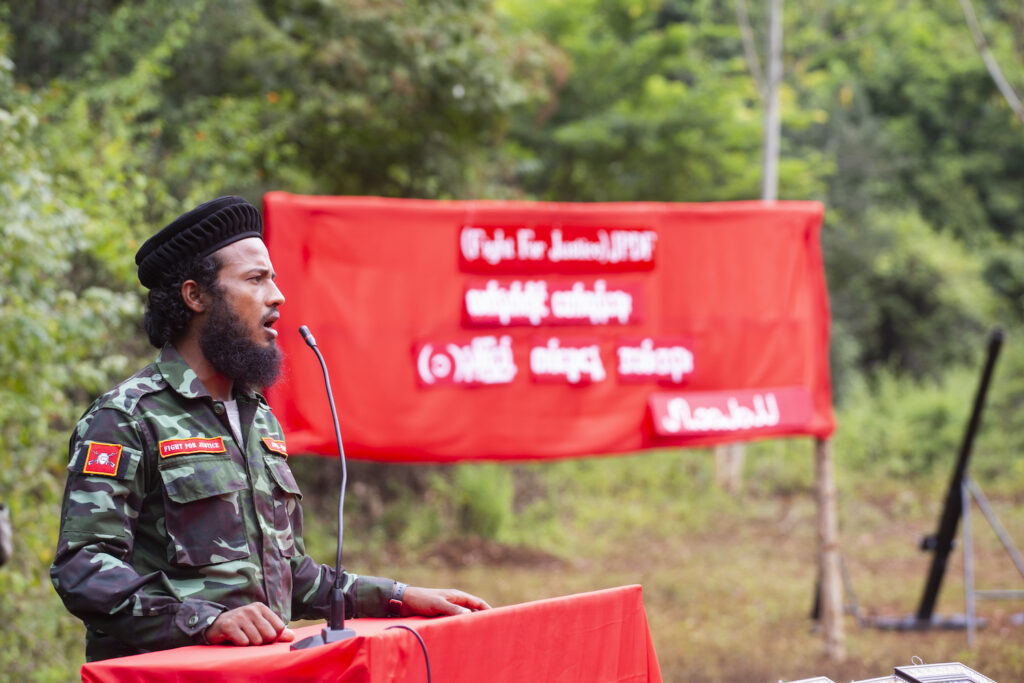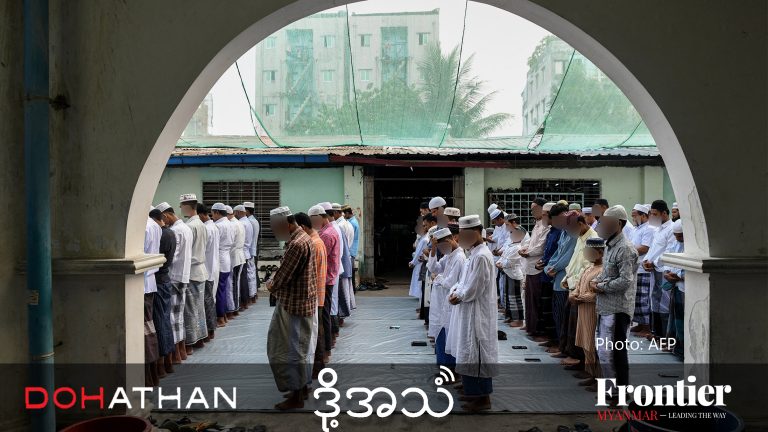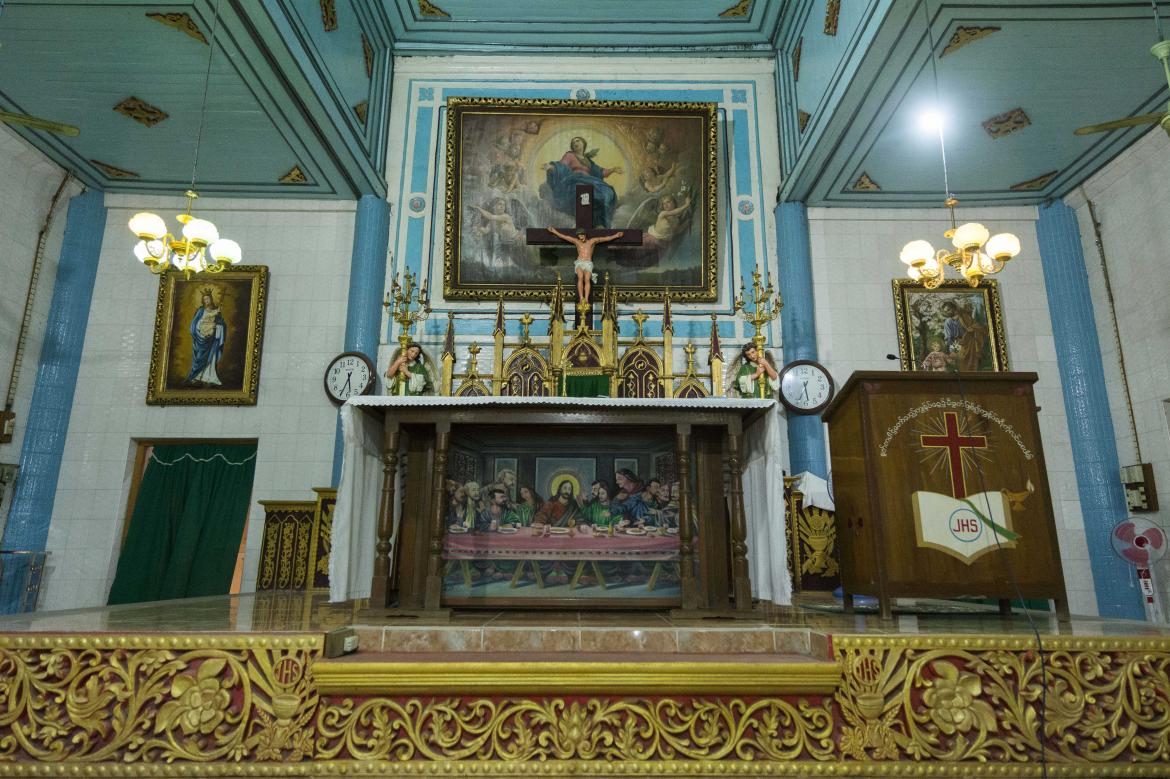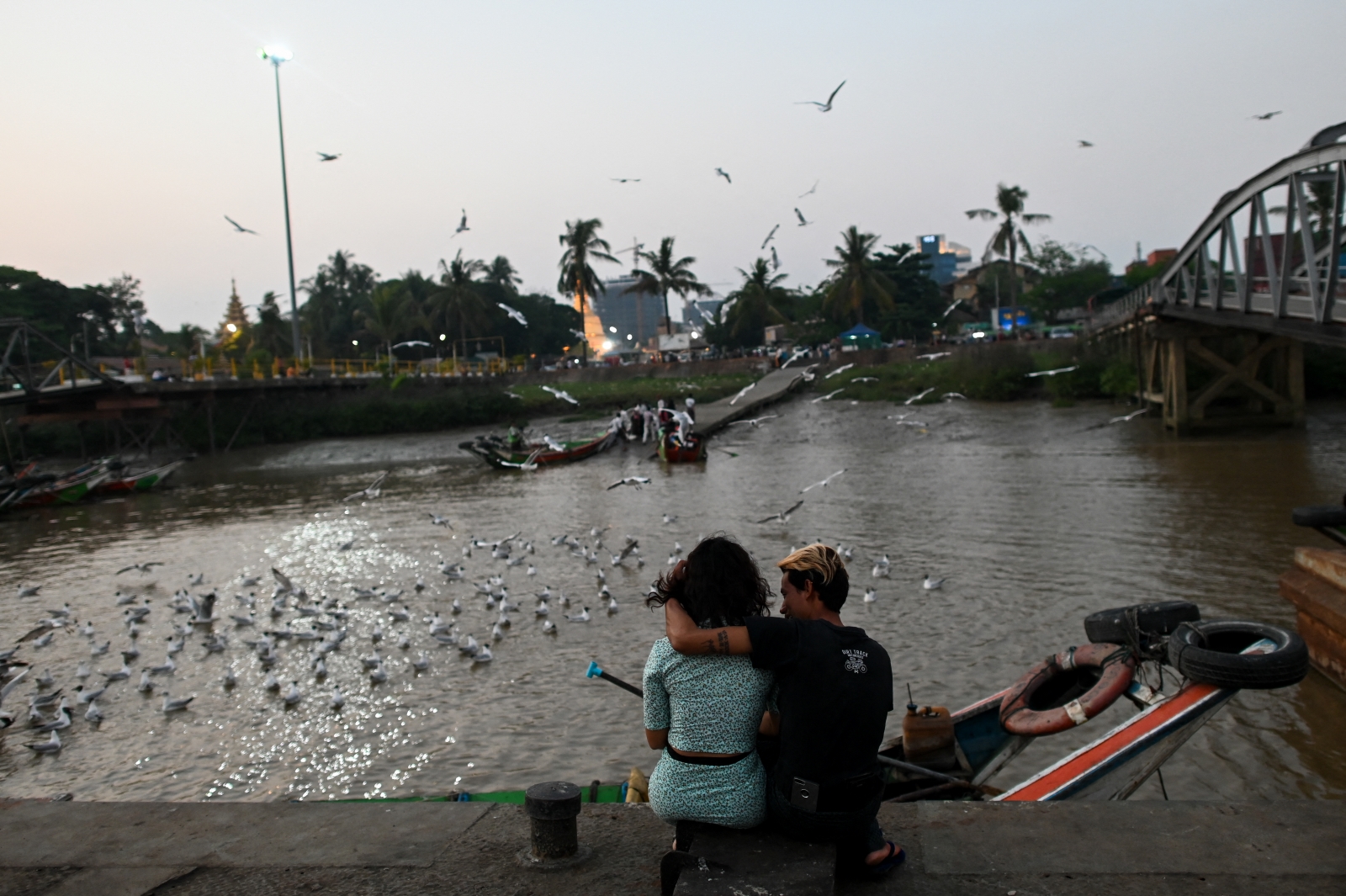Ko Bobo has emerged as one of the most respected resistance commanders in Kayah State, risking his life to protect the area’s Christian and Buddhist heritage and demanding justice for all Myanmar’s religious groups.
Ko Bobo paced around his modest motorcycle repair shop while gripping a homemade firearm. He took a seat and inserted one valuable bullet into the gun’s chamber, calmly considering the consequences of what he was about to do.
It was 2021, just a few months after the February coup, but the military had already destroyed large parts of Ko Bobo’s hometown, the Kayah State capital Loikaw.
Before the coup, the 35-year-old led a humdrum life servicing motorcycles out of his streetside garage. He joined the mass demonstrations, but when soldiers indiscriminately gunned down protesters, he shuttered his workshop and began making weapons out of spare automobile parts.
After a few months, in the dead of night, he finished producing a handgun capable of taking .22 calibre cartridges. He was eager to test the gun in his little workshop and couldn’t wait for the morning.
“I was crazy enough to think if it worked, that the next morning I’d be out there shooting these guys,” Ko Bobo told Frontier during a lengthy phone interview.
When he pulled the trigger, a deafening bang reverberated throughout his quiet neighbourhood. Although he was pleased the firearm worked, Ko Bobo knew immediately he had made a mistake. His wife rushed down from their upstairs apartment to check on him, and there and then they decided to take their two sleeping children and run.
The family hastily grabbed essentials for their escape into the unknown. But before leaving, Ko Bobo held his treasured copy of the Qur’an, faced the direction of his mosque and fell to his knees in prayer. He called out to Allah to protect him and his family for the perilous journey ahead.
The decision to flee was the right one. The following day, soldiers who were alerted by the explosion searched his family’s home and seized the property.
For the crescent and the cross
Ko Bobo was born into a tiny Muslim minority in Kayah, also known as Karenni State, Myanmar’s smallest state or region by area and population, where the vast majority are Christian or Buddhist. A 2018 survey by the General Administration Department counted just 2,146 Muslims out of some 400,000 people in the state, although official data on ethnicity is notoriously unreliable in Myanmar. This small religious community is served by just two mosques, both in Loikaw.
After fleeing his home, Ko Bobo attended military training with the Kayan New Land Party, an armed group representing the largely Christian Kayan minority that occupies mountains bordering Kayah, Kayin and southern Shan states. The KNLP launched a rebellion in 1964 but has observed a ceasefire with the Tatmadaw for almost 30 years, and was given control of Kayah State Special Region 3 in exchange for transforming to a military-aligned militia.
Despite this, in the early days after the coup, the KNLP surreptitiously provided training to new resistance groups, and has sometimes also mediated between resistance groups and the military.
After his training, Ko Bobo travelled to Kayah’s Demoso Township, where fighting has been particularly fierce. He helped establish a new resistance group in October 2021, the Justice People’s Defence Force, and was immediately plunged into battle.
“We aren’t at all interested in doing administrative work – I don’t want to control anywhere. We hate the military that has bullied us for years, so when we formed, our only goal was to attack. We represent justice for all people – so we named our group the Justice PDF,” he said.
At the start, JPDF relied solely on homemade weapons and struggled to find donations. In February last year, four of its fighters were killed in a clash with Tatmadaw troops who were marching from Moebye town in southern Shan State to Demoso.
The next month, the JPDF participated in its fiercest fight to date – the battle of Demoso’s Kyauksekkan village. The operation was carried out in partnership with the Karenni Democratic Front and the Demoso PDF. The latter is under the command of the National Unity Government, a parallel administration appointed by elected lawmakers deposed in the coup, although Ko Bobo’s JPDF remains independent. The KDF later claimed that more than 30 Tatmadaw soldiers were killed in the battle, a number that Frontier was unable to independently verify.
Ko Bobo claimed he personally killed three soldiers wielding an upgraded version of his homemade .22 calibre handgun.
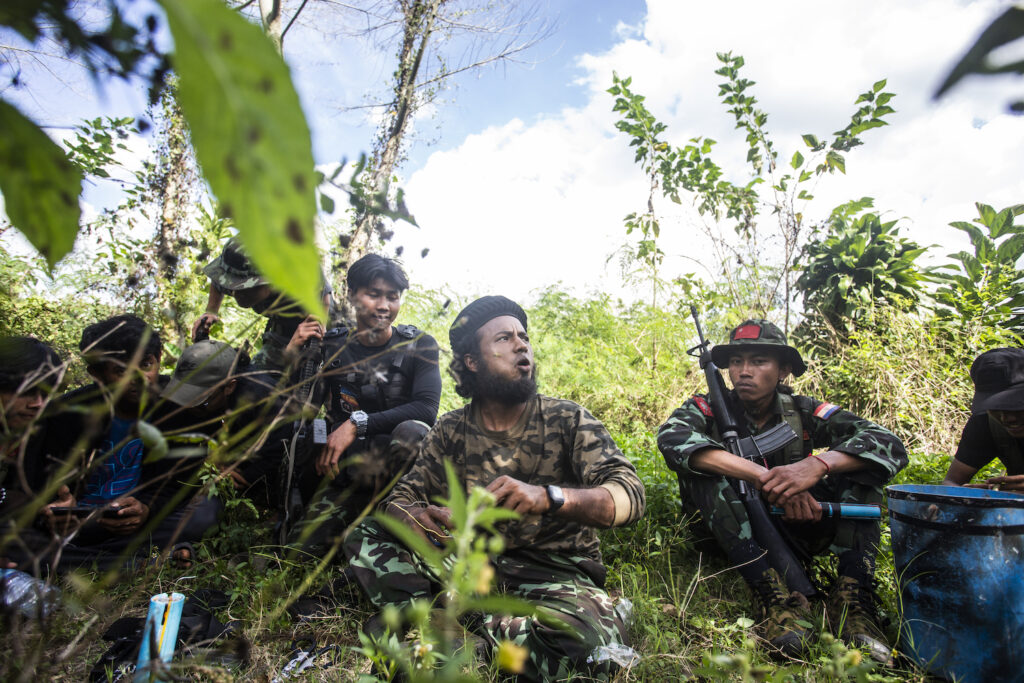
Because of his bravery, leadership and tactical acumen – shown again in a later battle in Kyauk Dam village – Ko Bobo was unanimously elected commander of the JPDF. He told Frontier he was made commander also because of his honesty and compassion, and that the role had pushed him to become more mature. As commander, he focused on improving the group’s weaponry and building alliances with other armed resistance groups.
In April last year JPDF merged with the KDF and other allied groups, including Karenni Generation Z, GZ-21 Loikaw, Southern Shan PDF and the Medic Unit, to form the more formidable Karenni Revolution Union. Ko Bobo remains in charge of his JPDF troops as a column commander in the KRU.
The KRU later allied with the Karenni Nationalities Defence Force – Kayah’s largest armed group, which functions as an umbrella group under the Karenni Army’s leadership – but remains independent from it.
The desecration of Kayah State
Ko Bobo’s followers say despite his different faith, he shares their pain when Christians or Buddhists suffer under the military.
“Bobo is someone who respects Christian churches and does as much as possible to protect them. He would never attack troops or deploy fighters near churches,” said Khun Lay, a Christian JPDF fighter. “When junta forces destroy churches and [Buddhist] monasteries in Karenni land, we are heartbroken, and Ko Bobo always feels the same way.”
The military has regularly targeted Christian sites in Kayah and elsewhere since the coup. The majority Christian Chin State has been the most affected, but in Kayah, the Tatmadaw has destroyed at least 30 religious buildings, both Christian and Buddhist, according to the resistance-affiliated Progressive Karenni People Forces information centre. Of these, more than 20 buildings were destroyed last year alone.
Like in many other parts of Myanmar even before the coup, churches and Buddhist monasteries have provided shelter to displaced civilians and those fleeing military raids. Such sites are protected under international humanitarian law, but this doesn’t seem to deter the Tatmadaw. When conflict first broke out in Kayah after the coup, churches would fly white flags to indicate the presence of sheltering civilians, but the military allegedly attacked them anyway.
“It cannot be an accident when mortars are fired at a church,” said a Roman Catholic priest who asked to remain anonymous. “We used to fly a white flag and a Christian flag, but it wouldn’t stop the junta’s troops, so we can say they are intentionally attacking the churches.”
The priest said that due to the intensity of the fighting, many churches closed their doors, unable to accommodate the numbers seeking refuge, while the clergy fled to safer areas like Loikaw.
The Karennni Human Rights Group last year estimated that over half of the state had been displaced by fighting since the coup, with some fleeing to neighbouring Thailand and parts of southern Shan State.
Demoso, where Ko Bobo operates, is no exception, with resistance forces estimating only 10 percent of the pre-coup population remains in their homes. With a proud Catholic and Baptist Christian tradition, almost all of Demoso’s large religious sites have been desecrated by the military, with many lying in ruins. These include the 6 Mile Temple, St. Joseph Catholic Church, Queen of Peace Church and Demoso Baptist Church.
Ko Bobo said some of this destruction is a result of the military occupying these sites.
“Of course they [the military] could fight without damaging the temples. But the war dogs deliberately camp at and target religious buildings. As revolutionary groups who honour these sanctuaries, we retreat, but this makes it more difficult to fight them,” said Ko Bobo. “We could choose to burn these buildings in advance or booby trap them with explosives. But, of course, we never will… we do everything in our power to protect religious buildings.”
Ko Bobo recalled one incident during the battle for Moebye town in southern Shan, when one of his troops was shot and killed near a church where Tatmadaw troops were stationed. He said they couldn’t retrieve the body for fear that further fighting would damage the building.
“I feel extreme anger when I see churches being destroyed. When Christian worshippers lose their churches, I feel the pain of losing a mosque. If there are no more temples, no religious groups can honour their gods,” Ko Bobo told Frontier.
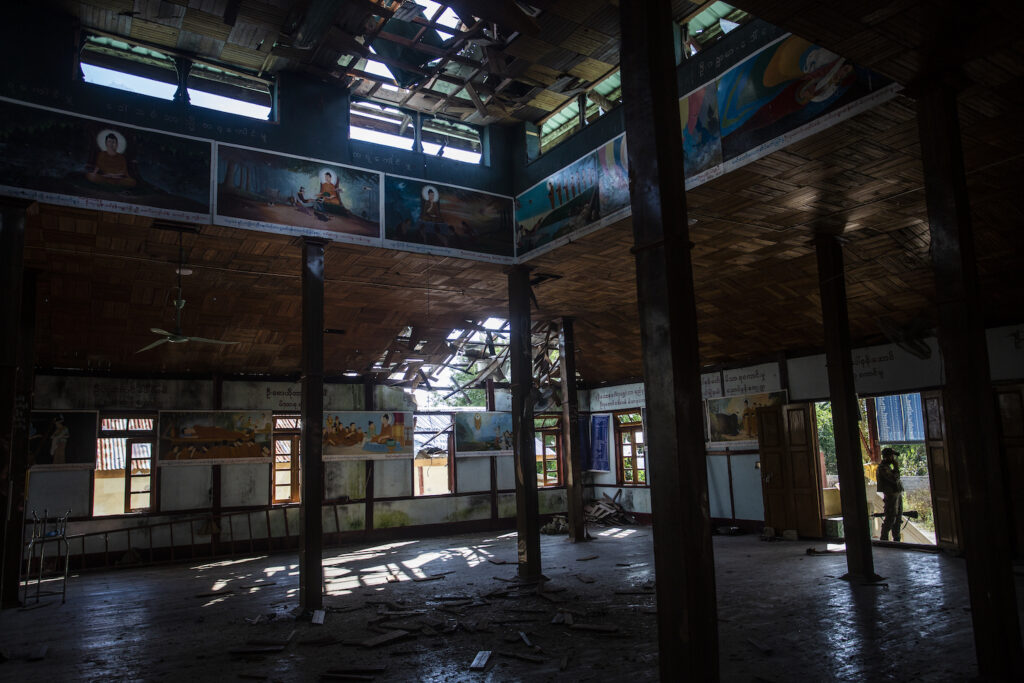
Ko Bobo says this sympathy was developed because of his own experience of religious persecution. As a young Muslim growing up in Myanmar in the late 1990s, he saw his religious community denied the rights afforded to others.
Ko Bobo, whose father is a Bamar Muslim and mother Karenni Muslim, said he and his parents were never able to acquire national IDs known as Citizenship Scrutiny Cards, meaning he was deprived of the basic rights afforded to Myanmar citizens.
“It’s terribly hard to be a Muslim in Myanmar. I didn’t receive things taken for granted by others,” he said. “Muslims don’t even get the opportunity to study – even if they are sharp – and are refused jobs even if they are talented… Even if I wanted to save money and buy land, I would not be allowed because of my religion.”
He told Frontier that the Spring Revolution must end all forms of repression, including by scrapping the 1982 Citizenship Law, which many say is applied in an arbitrary and discriminatory way to oppress Muslims and other minority groups.
“I want to encourage all my Muslims brothers to understand that justice is not something that is gifted automatically, but a right we must fight for,” he said.
Many Muslims have joined resistance groups or allied ethnic armed groups, with some even forming their own militia in October last year, called the People Liberation Muslim Front. The group announced that it would fight with other armed groups against the regime, but details of its operations remain scarce.
The PLMF’s leader told Frontier that, as Muslims, his fighters and their communities have been oppressed for years, making it difficult for them to form an armed group that is widely accepted by the public. He said that Muslim fighters were training in territory claimed by ethnic armed groups, because they have no region to call their own.
Tun Kyi, information officer for the Spring Revolution Myanmar Muslim Network, a group formed by Muslim activists and former political prisoners, said he believes the views of Myanmar’s Bamar Buddhist majority have changed drastically since the coup, but that this change hasn’t gone far enough.
“Muslim heroes have participated in every battle in Myanmar across the ages. They gave their lives and fought fiercely for their country. So why must we still experience this Islamophobia?” asked Tun Kyi, who is himself a former political prisoner.
He criticised the NUG for failing to appoint any Muslim representatives; the human rights ministry includes a Rohingya Muslim “advisor”, but no Muslims occupy a minister or deputy minister position.
NUG officials had promised a meeting with Muslim activists to discuss plans to repeal the discriminatory 1982 Citizenship Law among other matters, but Tun Kyi says he is dissatisfied that no further statement on the matter has been made.
“This is an unjust law; we call it the Nazi law. Because of this law, we Muslims don’t have the rights of free citizens. [NUG] officials must match their ideals with deeds, rather than continuing to pacify the Muslim people with empty words,” he said.
Tun Kyi said he was proud of all Muslims participating in the armed struggle against the military, and that he especially admires Ko Bobo for protecting Kayah churches.
In October last year, the JPDF celebrated its one-year anniversary with a parade in Demoso Township. At the front stood a man with a thick black beard, wielding an unusual gun made in a small motorcycle garage in Loikaw.


